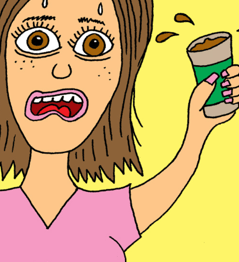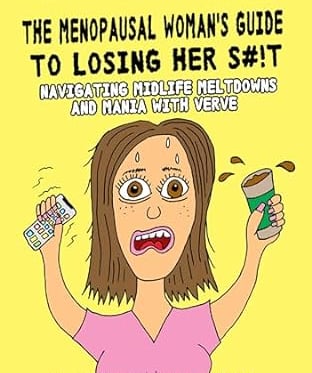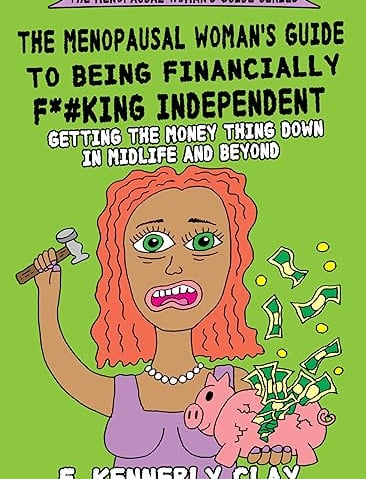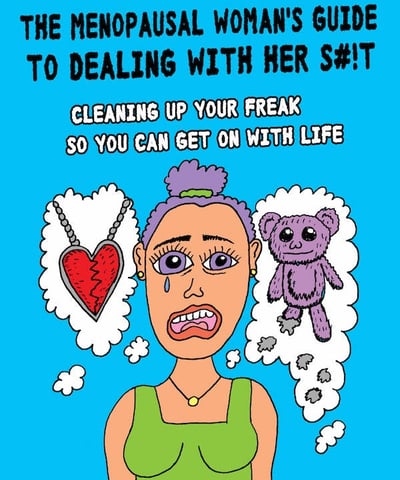Feeling Sad in Menopause: It's a Thing
Serotonin's role in mood stabilization means that lower levels can make you more susceptible to feelings of sadness in menopause. Here's what you should know.
MENOPAUSAL MENTAL HEALTHMENOPAUSAL SYMPTOMSMENOPAUSAL DEPRESSION
Kennerly Clay
7/30/20245 min read


Why do I feel sad in menopause?
If you're feeling mopey and sad in menopause, join the crew. As if the hot flashes, deadening fatigue, and brain fog weren't enough to do you in, now comes the depression. Whether you're teetering on the brink or down in a well of hell, menopausal upheaval may be mostly to blame.
Depression in menopause is often linked to fluctuations in estrogen, one of the primary female sex hormones, which has a profound impact on mood regulation. It affects the levels of serotonin, a neurotransmitter known as a "feel good" hormone, which plays a role in maintaining mood balance and closely connected to menopause and mental health.
During menopause, the decline in estrogen levels leads to reduced serotonin production. This reduction can result in mood swings, irritability, and even depressive symptoms. Serotonin's crucial role in mood stabilization means that lower levels can make you more susceptible to feelings of sadness and anxiety.
In an article published in the Journal of Clinical Endocrinology & Metabolism, scientists report "Women are at increased risk for mood disturbance across the perimenopause, with 45% to 68% developing depressive symptoms during this reproductive transition."
Similarly, progesterone, another significant hormone, undergoes fluctuations during menopause. Progesterone has a calming effect on the brain, and its decline can contribute to increased anxiety and feelings of unease. The combination of fluctuating estrogen and progesterone levels creates a hormonal shitshow that can directly impact your emotional well-being.
If you or someone you know is in crisis, please call 988, the Suicide & Crisis Lifeline in the United States.
Menopausal physical symptoms and sadness
Menopause can also bring a host of physical symptoms, which can result in emotional repercussions. Symptoms like hot flashes, night sweats, and sleep disturbances can lead to a reduction in overall sleep quality. Poor sleep quality during menopause significantly correlates with heightened levels of depression and anxiety. (Three a.m. wake-ups, anybody?) The cyclical nature of sleep disturbances and emotional distress means that insufficient rest can exacerbate feelings of sadness, creating a challenging feedback loop. It's not uncommon to find yourself crying all the time in menopause.
Some women in menopause are plagued by chronic pain and discomfort, from conditions like osteoporosis or joint pain. Chronic pain has been well-documented in the medical literature as a significant contributor to mood disorders, including depression. I can attest to this myself, having lived with chronic pain from a car accident that happened to coincide with the onset of perimenopause and mental malaise. Obviously, persistent physical discomfort can lead to a reduced quality of life, making everyday activities more difficult and less enjoyable, which may further amplify your emotional distress. All combined, of course, it may seem like menopause makes depression and other pre-existing or potential mental health issues worse.
The interplay between physical symptoms and emotional well-being during menopause is complex and multifaceted. Hot flashes and night sweats not only disrupt sleep but also create a sense of unpredictability and loss of control, which can contribute to anxiety and mood swings. Our bodies feel totally out of whack, making us feel all-around out of whack.
Medical intervention or lifestyle changes can help. But women are often so blindsided by a host of symptoms, it's hard to "diagnose" what's really going on. Simple aging? Symptoms of perimenopause? Something more serious? Having newfound health concerns can be stressful and upsetting, and downright depressing. Women who are going through this stage and are plagued by such symptoms often wonder if they'll ever be happy again after menopause.
Menopause survival tip sheet
The Menopause Madness Relief Kit is a hand-curated list of menopausal survival tips from women who've been to hell and back.


"Mental symptoms such as irritability, anger, and feelings of depression also increase around menopause. It is estimated that 26–33% of women experience their first depressive episode in the menopausal transition period." - BMC Womens Health
Coping with feelings of sadness in menopause
Experiencing emotional fluctuations during menopause is common, but there are a number of strategies to help you cope effectively. One of the most beneficial approaches is incorporating regular exercise into your routine. A study in Obstetrics and Gynecologic Clinics of North America indicates that physical activity can improve menopausal symptoms such as chronic pain and sleep disturbances, and could thus impact mood during menopause. Engaging in activities such as walking, swimming, or yoga releases endorphins, which act as natural mood lifters, and reduce stress. Finding time to take short walks in nature or just stepping outside for a deep breath and a decompress can be helpful.
Nutrition also plays a crucial role in emotional well-being. A balanced diet that includes plenty of fruits, vegetables, lean proteins, and whole grains can help stabilize blood sugar levels, which in turn can affect mood. Omega-3 fatty acids, found in fish and flaxseeds, have been linked to improved mood regulation. Staying hydrated and limiting caffeine and alcohol intake can also contribute to emotional stability during menopause. In general, start taking a radical self-care approach, putting your body and your well-being first, always.
Mindfulness practices, such as meditation and deep breathing exercises, can be effective in managing emotional changes. These practices help increase awareness of your thoughts and feelings, fostering a sense of control and reducing anxiety.
For some women, hormone replacement therapy (HRT) may offer relief from emotional symptoms associated with menopause. HRT can help balance hormone levels, potentially easing mood swings and depressive symptoms. Some women find success with bio-identical hormone replacement therapy (BHRT), which are man-made hormones identical to those your body produces. Be sure to discuss the risks and benefits of HRT and BHRT with a trusted healthcare provider.
And finally, get yourself a good therapist. Feeling sad in menopause doesn't mean having to suffer for years on end. If you recognize symptoms that concern you, talk to someone who can help. Therapy or counseling can provide a safe space to discuss emotional challenges and develop coping strategies. Menopause support groups, whether in-person or online, can also offer a sense of community and shared experience, helping to alleviate feelings of isolation. Here's what else helps menopause depression.
Wanna talk more about sadness in menopause?
Books for women who are losing it in menopause
Mental Health
Losing your mind in peri/menopause?
The menopausal woman's guide series
Financial Health
Had enough of financial insanity?
Personal Growth
Triggers? Old stuff kicking up?
Related topics
Explore helpful articles, tips, and advice for women who are losing their shit in menopause.
Community
Stay Connected
© 2024. Eclectic Content, Inc. All rights reserved.






